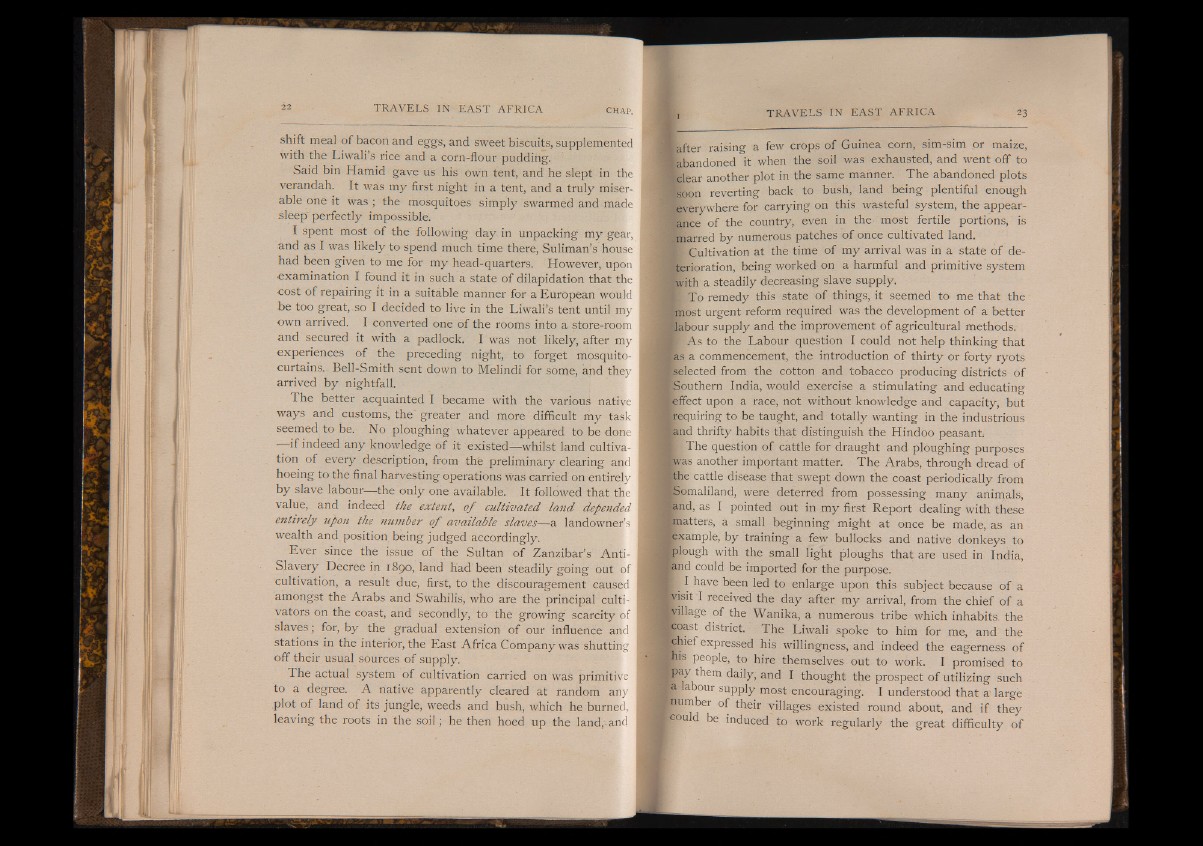
shift meal of bacon and eggs, and sweet biscuits, supplemented
with the Liwali’s rice and a corn-flour pudding.
Said bin Hamid gave us his own tent, and he slept in the
verandah. It was my first night in a tent, and a truly miserable
one it was ; the mosquitoes simply swarmed and made
sleep' perfectly impossible.
I spent most of the following day in unpacking my gear,
and as I was likely to spend much time there, Suliman’s house
had been given to me for my head-quarters. However, upon
examination I found it in such a state of dilapidation that the
cost of repairing it in a suitable manner for a European would
be too great, so I decided to live in the Liwali’s tent until my
own arrived. I converted one of the rooms into a store-room
and secured it with a padlock. I was not likely, after my
experiences of the preceding night, to forget mosquito-
curtains.. Bell-Smith sent down to Melindi for some, and they
arrived by nightfall.
The better acquainted I became with the various native
ways and customs, the greater and more difficult my task
seemed to be. No ploughing whatever appeared to be done
^ i f indeed any knowledge of it existed—whilst land cultivation
of every description, from thé preliminary clearing and
hoeing to the final harvesting operations was carried on entirely
by slave labour— the only one available. It followed that the
value, and indeed the extent, o f cultivated land depended
entirely upon the number o f available slaves— a landowner’s
wealth and position being judged accordingly.
Ever since the issue of the Sultan of Zanzibar’s Anti-
Slavery Decree in 1890, land had been steadily going out fof
cultivation, a result due, first, to the discouragement caused
amongst the Arabs and Swahilis, who are the principal cultivators
on the coast, and secondly, to the growing scarcity of
slaves ; for, by the gradual extension of our influence and
stations in the interior, the East Africa Company was shutting
off their usual sources of supply.
The actual system of cultivation carried on was primitive
to a degree. A native apparently cleared at random any
plot of land of its jungle, weeds and bush, which he burned,
leaving the roots in the soil ; he then hoed up the land, and
1 after raising a few crops of Guinea corn, sim-sim or maize,
■ abandoned it when the soil was exhausted, and went off to
n i ar another plot in the same manner. The abandoned plots
soon reverting back to bush, land being plentiful enough
everywhere for carrying on this wasteful system, the appearance
of the country, even in the most fertile portions, is
marred by numerous patches o f once cultivated land,
ft Cultivation at the time of my arrival was in a state of deterioration,
being worked on a harmful and primitive system
with a steadily decreasing slave supply.
I To remedy this state of things, it seemed to me that the
most urgent reform required was the development of a better
labour supply and the improvement of agricultural methods.
1 As to the Labour question I could not help thinking that
|as a commencement, the introduction of thirty or forty ryots
| selected from the cotton and tobacco producing districts of
[ Southern India, would exercise a stimulating and educating
effect upon a race, not without knowledge and capacity, but
; requiring to be taught, and totally wanting in the industrious
[and thrifty habits that distinguish the Hindoo peasant,
I The question of cattle for draught and ploughing purposes
twas another important matter. The Arabs, through dread of
| the cattle disease that swept down the coast periodically from
I Somaliland, were deterred from possessing many animals,
land, as I pointed out in my first Report dealing with these
I matters, a small beginning might at once be made, as an
i example, by training a few bullocks and native donkeys to
plough with the small light ploughs that are used in India,
land could be imported for the purpose.
ft I have been led to enlarge upon this subject because of a
ifisit I received the day after my arrival, from the chief of a
»ullage of the Wanika, a numerous tribe which inhabits the
ftoast district. The Liwali spoke to him for me, and the
fehief expressed his willingness, and indeed the eagerness of
people, to hire themselves out to work. I promised to
■iy them daily, and I thought the prospect of utilizing such
our suPply most encouraging. I understood that a large
»umber of their villages existed round about, and if they
■jb d be, induced to work regularly the great difficulty of